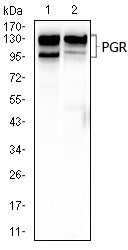
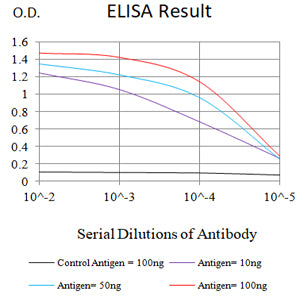
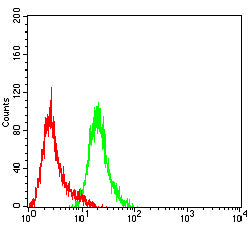
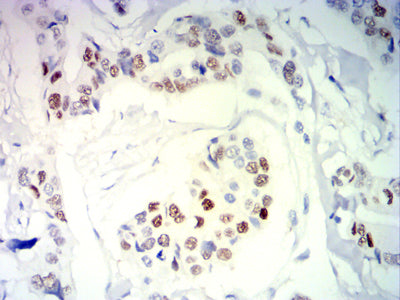
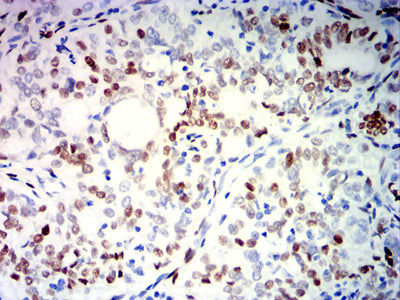
| WB | 1/500 - 1/2000 | Human,Mouse,Rat |
| IF | 咨询技术 | Human,Mouse,Rat |
| IHC | 1/200-1/1000 | Human,Mouse,Rat |
| ICC | 技术咨询 | Human,Mouse,Rat |
| FCM | 1/200-1/400 | Human,Mouse,Rat |
| Elisa | 1/10000 | Human,Mouse,Rat |
| Aliases | PR; NR3C3 |
| Entrez GeneID | 5241 |
| clone | 2E9F2 |
| WB Predicted band size | 99kDa |
| Host/Isotype | Mouse IgG1 |
| Antibody Type | Primary antibody |
| Storage | Store at 4°C short term. Aliquot and store at -20°C long term. Avoid freeze/thaw cycles. |
| Species Reactivity | Human, Mouse |
| Immunogen | Purified recombinant fragment of human PGR (AA: 166-411) expressed in E. Coli. |
| Formulation | Purified antibody in PBS with 0.05% sodium azide |
+ +
以下是关于PGR(孕酮受体)抗体的3篇参考文献摘要,供参考:
---
1. **文献名称**:*Progesterone receptor status and the clinicopathological characteristics of breast cancer: A meta-analysis*
**作者**:Smith E, et al.
**摘要**:该研究通过荟萃分析评估了PGR抗体在乳腺癌组织中的表达及其与临床病理特征(如肿瘤分级、生存率)的关联。研究发现,PGR阴性患者往往预后较差,提示PGR抗体检测对乳腺癌分型和治疗决策的重要性。
---
2. **文献名称**:*Standardization of progesterone receptor immunohistochemistry in breast cancer: Guidelines from the International Society of Applied Immunohistochemistry*
**作者**:Jones R, et al.
**摘要**:本文提出PGR抗体在免疫组化(IHC)检测中的标准化操作流程,比较了不同抗体克隆(如1A6、PgR636)的特异性和敏感性,强调标准化对提高诊断一致性的必要性。
---
3. **文献名称**:*Development of a novel monoclonal antibody for progesterone receptor analysis in ovarian cancer*
**作者**:Wang L, et al.
**摘要**:研究团队开发了一种新型PGR单克隆抗体(克隆号:3D7),并通过Western blot和IHC验证其在卵巢癌组织中的高特异性和稳定性,为妇科肿瘤的激素受体检测提供了新工具。
---
如需具体文献全文,建议通过PubMed或Web of Science检索标题或作者信息获取。
Progesterone receptor (PR) antibodies are essential tools in biomedical research and clinical diagnostics, primarily used to detect the presence and distribution of progesterone receptors (PRs) in tissues. PRs, encoded by the *PGR* gene, are nuclear hormone receptors that mediate progesterone signaling, playing critical roles in reproductive physiology, menstrual cycle regulation, and pregnancy maintenance. Two primary PR isoforms, PRA and PRB, derived from alternative splicing, exhibit distinct tissue-specific functions and regulatory mechanisms.
In clinical oncology, PR antibody-based assays, particularly immunohistochemistry (IHC), are pivotal in breast cancer management. PR expression, alongside estrogen receptor (ER) status, guides hormonal therapy decisions (e.g., tamoxifen) and predicts treatment response. PR positivity often correlates with favorable prognosis and endocrine therapy efficacy. However, PR levels can vary dynamically due to hormonal fluctuations or tumor heterogeneity, necessitating standardized testing protocols. Additionally, PR antibodies aid in studying reproductive disorders, endometrial pathologies, and ovarian function. Their utility extends to experimental models exploring progesterone's role in neuroprotection, immune modulation, and cardiovascular health. Ongoing advancements aim to refine antibody specificity, improve quantitative assessment, and elucidate PR's complex crosstalk with other signaling pathways in both normal and diseased states.
×